How does the composting process work?
Compost is made of organic materials that has been decomposed and is then recycled as a soil amendment fertilizer. Compost is a key ingredient in organic farming and gardening, and is sometimes called "black gold" because of the dark, rich, earthy look and feel it gets when it is ready to be used.
Compost is the best base for a good garden, whether you grow flowers, vegetables, shrubs or trees.
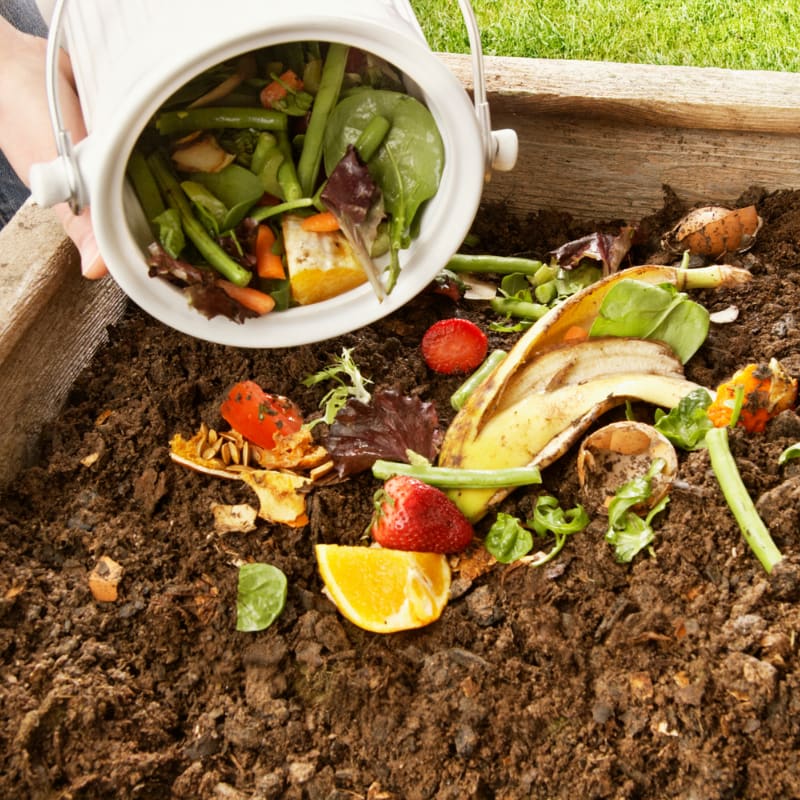 The natural process of composting simply requires making a heap of wetted organic matter (leaves, "green" food waste, etc.) and waiting for the materials to break down into humus after a period of weeks or months. The speed that materials decompose into good, usable compost material depends on your compost recipe: getting sufficient amounts of water and air, as well as carbon and nitrogen rich materials.
The natural process of composting simply requires making a heap of wetted organic matter (leaves, "green" food waste, etc.) and waiting for the materials to break down into humus after a period of weeks or months. The speed that materials decompose into good, usable compost material depends on your compost recipe: getting sufficient amounts of water and air, as well as carbon and nitrogen rich materials.
The easiest way to compost is to simply create a pile and wait. Containers can be created or purchased that allows access to turn the material. There are many types of composting containers and worm bins (even for use indoors with limited space) which is a good subject for another day.
Depending on conditions and the climate, it can take up to 20 months for the pile to decay. With a little effort, however, decent compost can be made in as little as eight to twelve weeks.
Download our guide to home composting here!
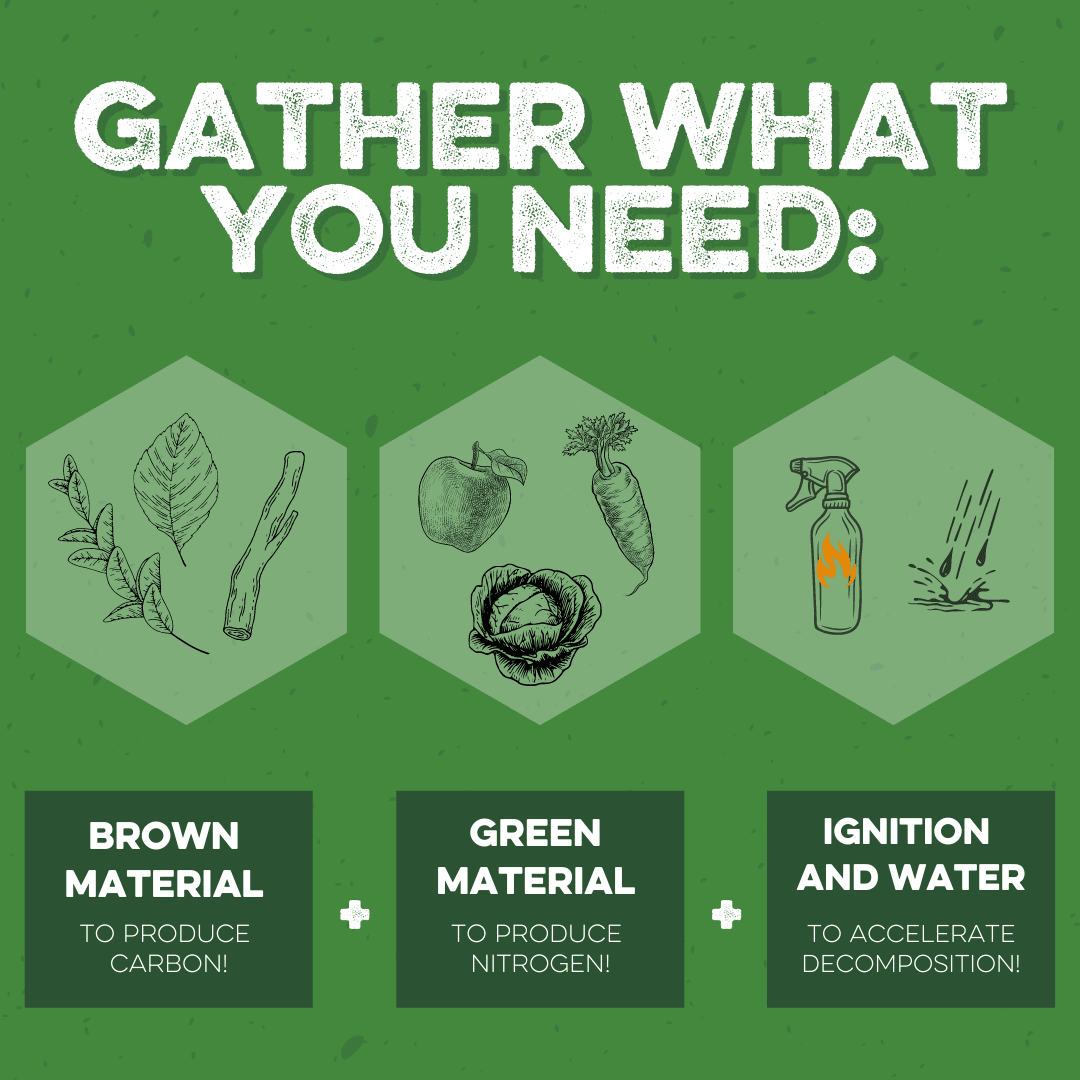
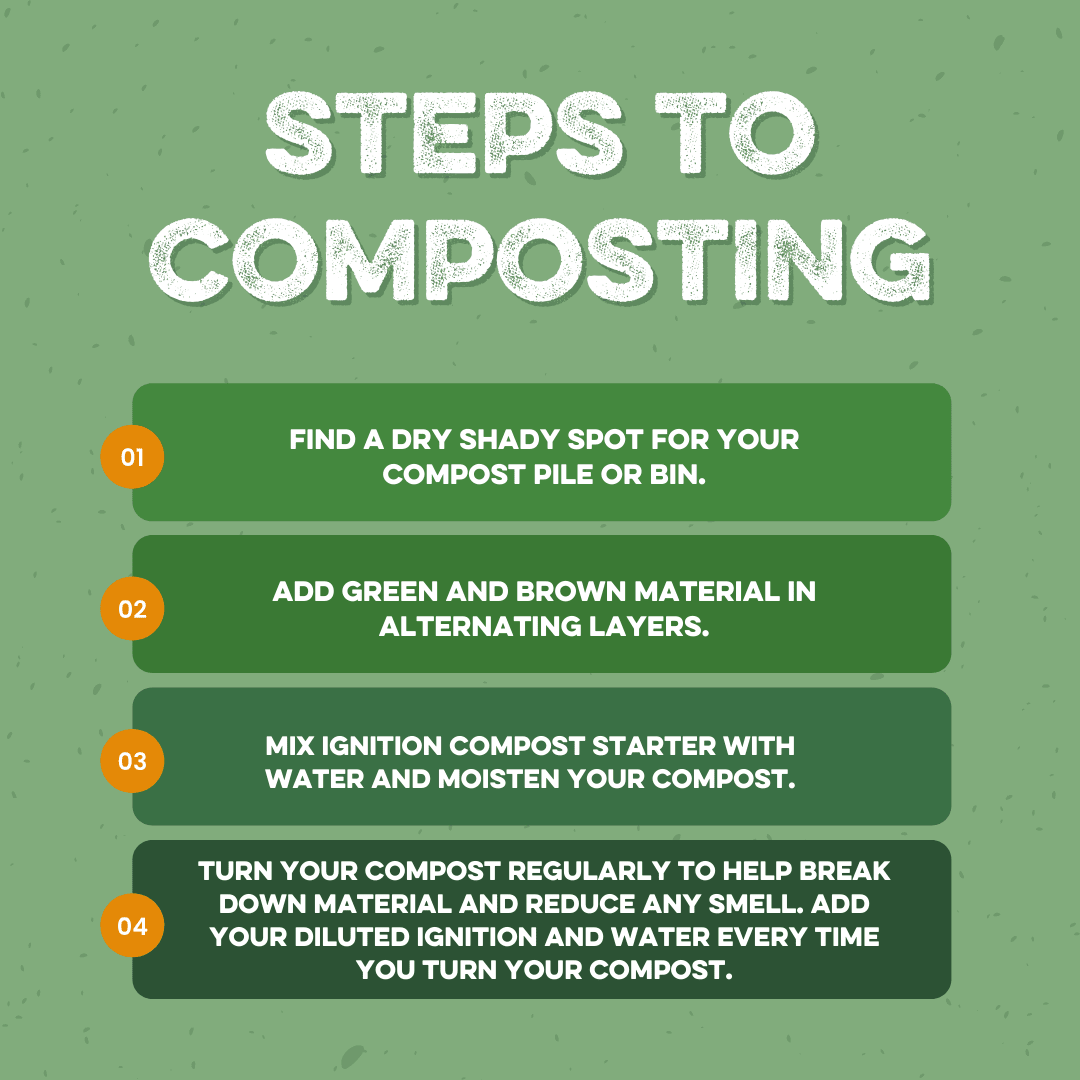
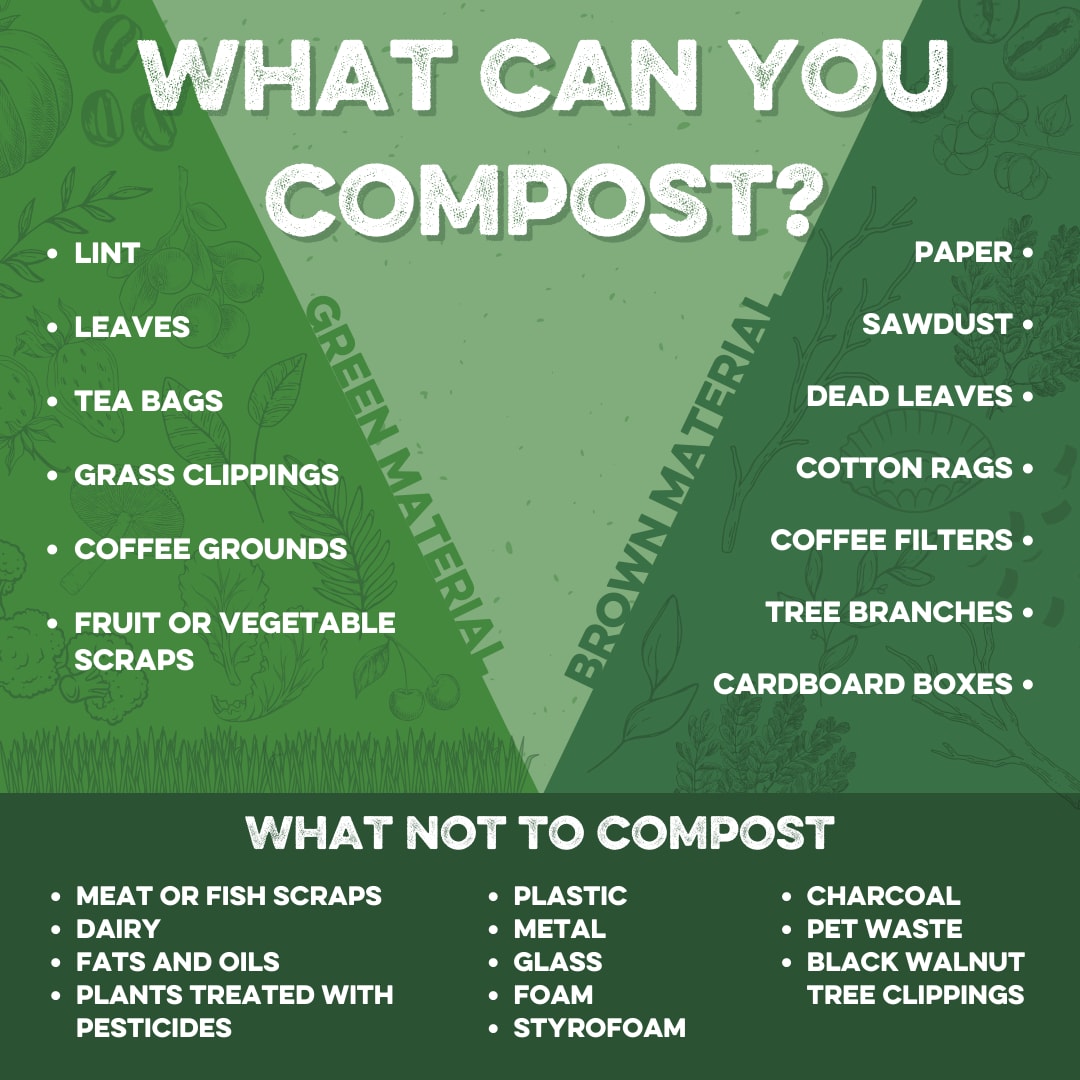
Our Compost Recipe
Just remember this simple rhyme about composting:
Brown, green, blue and white, that’s the way to compost right.
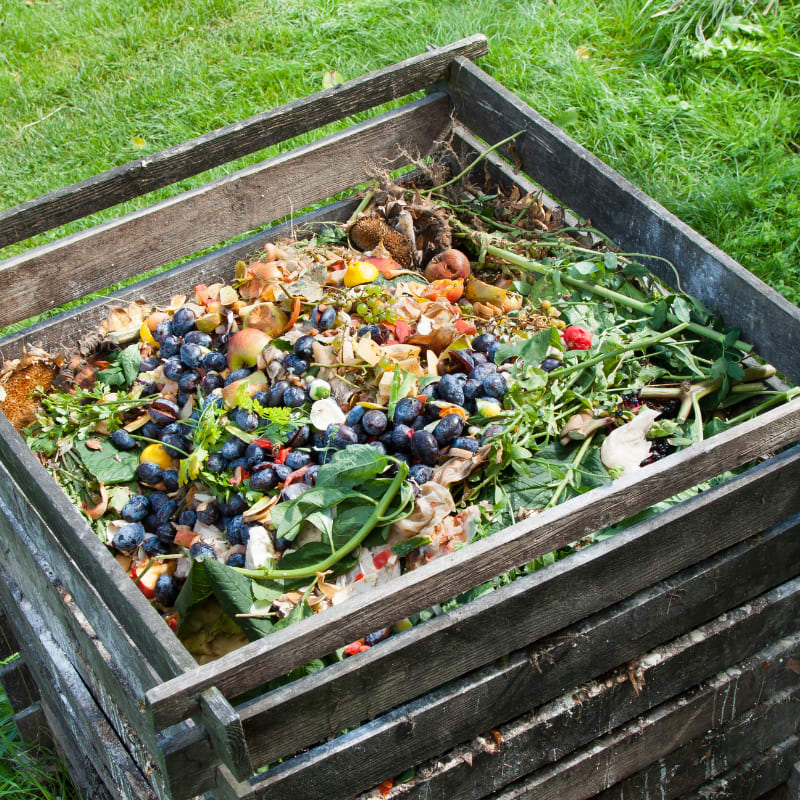 The secret to successful composting is a matter of balancing carbon-heavy ingredients (brown) with nitrogen-heavy components (green), then making sure there is enough water (blue) and air (white). This is the easiest recipe for compost.
The secret to successful composting is a matter of balancing carbon-heavy ingredients (brown) with nitrogen-heavy components (green), then making sure there is enough water (blue) and air (white). This is the easiest recipe for compost.
Brown material can be almost anything organic that you'd find in your yard. Leaves, dry grass clippings, pine needles or pine cones all work well. Shredded or torn cardboard or paper can also be used. Compostable paper takeout containers come into play here too.
Green material often comes from the kitchen. Potato peels, carrot tops, apple cores, leftover pieces of celery or most any kind of fruit or vegetable matter will work. Coffee grounds and eggshells are also great staples.
Kitchen leftovers to avoid include meat, dairy and anything greasy. Don’t use cat or dog droppings, but manure from chickens, rabbits and other pets (any vegetarian animal) is useful.
Green and Brown Materials
Getting the proper proportion of green to brown is the trick to making compost. The recommended ratio is about three handfuls of brown to one handful of green. If you cannot get the exact proportions, it is not a huge problem but it will probably slow down the rate of composting.
Water
Water is essential for rapid composting. The pile should be consistently moist but not soggy. If you get rain consistently, there's no need to take action on the water component. If you go a long time without rain, you will likely have to add water to your compost pile. If you keep an indoor compost bin or your pile is in a covered area, you will also need to spray water on your compost when it begins to get dry.
Air
The final ingredient is air, which is needed to keep the decay process going. Use of a shovel or spading fork to turn a compost pile over occasionally should do the trick. Some see this part as more of an art than a science. The pile needs to be turned often enough to keep it mixed and aired, but it also needs to have resting time to allow the process to work. If your compost is in a bin, turner or other container, it will have instructions on how to properly aerate
Any worms and fungi added will further break down the material and increase the pace of the composting process.
When is it ready?
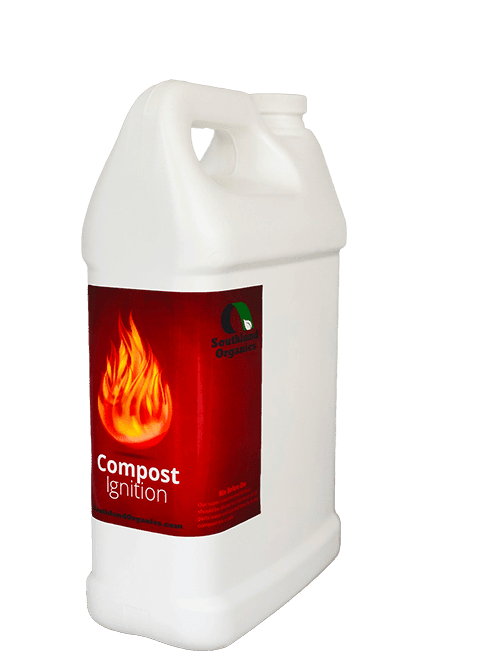 Compost is ready to use when it looks and smells like dark, rich, loamy soil. It can be spread in a thin layer on the lawn, worked into flower beds or used as mulch. Composting seems easy, but it takes practice and patience.
Compost is ready to use when it looks and smells like dark, rich, loamy soil. It can be spread in a thin layer on the lawn, worked into flower beds or used as mulch. Composting seems easy, but it takes practice and patience.
For those who want to speed up the process, a compost accelerator like Ignition from Southland Organics may be just the thing. Ignition compost accelerator uses a combination of carbon, humic acid and live biology to jump start the decomposition process, potentially shaving weeks off of your composting time.
What to Put in your Compost Bin
-
Yard waste (fallen leaves, small sticks, grass clippings)
-
Coffee grounds
-
Kitchen scraps
-
Fruit scraps
-
Vegetable peels
-
Tea bags (if they are in a paper-based/compostable bag)
-
Fresh manure (if it comes from a vegetarian animal, like chickens or rabbits)
-
Eggshells
-
Compostable paper take out containers
-
Paper towels
-
Shredded cardboard or paper
What NOT to Put in your Compost Bin
-
Diseased plant material
-
Dairy products
-
Trash
-
Processed or oily foods (this will attract pests)
-
Plastics that are marked as compostable (usually, these can only compost in commercial facilities)
-
Waste from animals that eat meat (like dogs or cats)
-
Meat or bones
-
Coated paper
-
Diseased or poisonous plants
Why you should Start a Compost Pile
So why compost? Obviously, the compost itself is beneficial for the land in many ways. It is a natural soil conditioner, a fertilizer, adds vital humus or humic acids and serves as a natural pesticide for soil.
Most home gardeners compost for several reasons: save money by creating “good dirt” instead of purchasing bags of potting soil; find a use for leaves and grass clippings instead of hauling them off; and, they like the idea of recycling so finding a place to put kitchen scraps, paper and cardboard appeal to them. Most importantly, compost adds nitrogen to feed plants, loosens soil to make room for roots, and nourishes microbes that help everything grow.
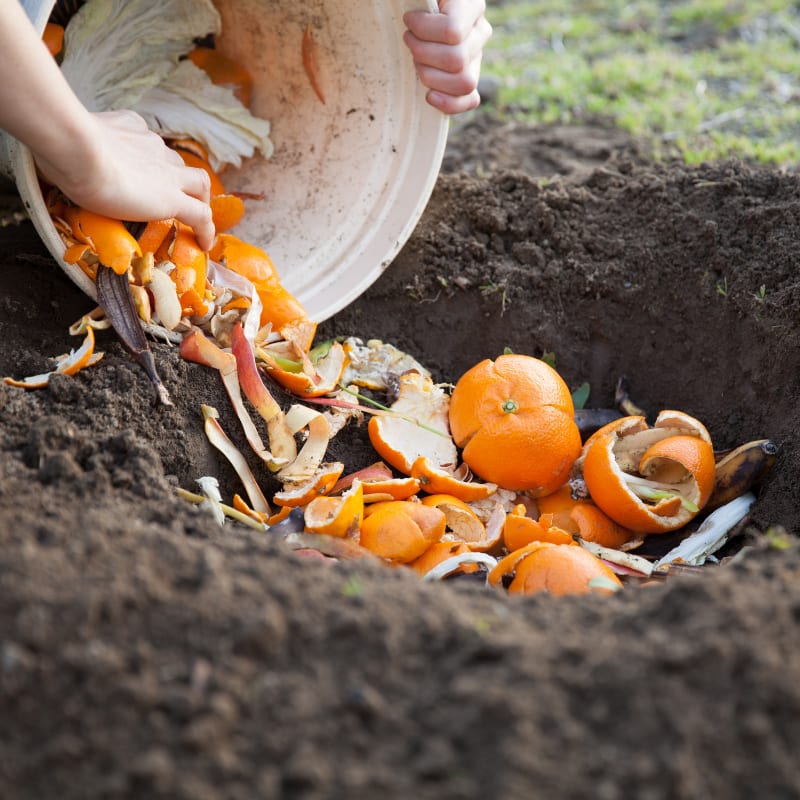 Remember when we were talking about air? Compost needs air because it breaks down organic matter aerobically (with air), which releases CO2. In a landfill, organics matter breaks down anaerobically (without air) since everything is so packed in together. This process releases methane, which is much more impactful as a greenhouse gas than carbon dioxide. Overall, composting your organic food and lawn waste is a much more eco-friendly decision than sending it to a landfill. Then you get a rich material for your garden and lawn in return!
Remember when we were talking about air? Compost needs air because it breaks down organic matter aerobically (with air), which releases CO2. In a landfill, organics matter breaks down anaerobically (without air) since everything is so packed in together. This process releases methane, which is much more impactful as a greenhouse gas than carbon dioxide. Overall, composting your organic food and lawn waste is a much more eco-friendly decision than sending it to a landfill. Then you get a rich material for your garden and lawn in return!
If you are considering composting, you now have several good reasons to start and there is no time like the present. Don’t delay, start today and have a beautiful garden in no time!








